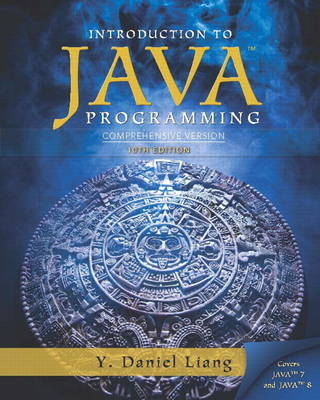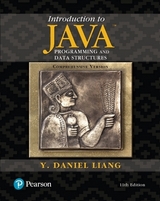
Intro to Java Programming, Comprehensive Version
Pearson (Verlag)
978-0-13-376131-3 (ISBN)
- Titel erscheint in neuer Auflage
- Artikel merken
MyProgrammingLab should only be purchased when required by an instructor.
This text is intended for a 1-, 2-, or 3-semester CS1 course sequence. Comprehensive coverage of Java and programming make this a useful reference for beginning programmers and IT professionals.
Daniel Liang teaches concepts of problem-solving and object-oriented programming using a fundamentals-first approach. Beginning programmers learn critical problem-solving techniques then move on to grasp the key concepts of object-oriented, GUI programming, advanced GUI and Web programming using Java. Liang approaches Java GUI programming using JavaFX, not only because JavaFX is much simpler for new Java programmers to learn and use but because it has replaced Swing as the new GUI tool for developing cross-platform-rich Internet applications on desktop computers, on hand-held devices, and on the Web. Additionally, for instructors, JavaFXprovides a better teaching tool for demonstrating object-oriented programming.
Teaching and Learning Experience
To provide a better teaching and learning experience, for both instructors and students, this program offers:
Fundamentals-First Approach: Basic programming concepts are introduced on control statements, loops, functions, and arrays before object-oriented programming is discussed.
Problem-Driven Motivation: The examples and exercises throughout the book emphasize problem solving and foster the concept of developing reusable components and using them to create practical projects.
A Superior Pedagogical Design that Fosters Student Interest: Key concepts are reinforced with objectives lists, introduction and chapter overviews, easy-to-follow examples, chapter summaries, review questions, programming exercises, and interactive self-tests.
The Most Extensive Instructor and Student Support Package Available: The author maintains a website at www.pearsonhighered.com/liang that includes multiple interactive resources.
Dr. Liang earned his Ph.D. in Computer Science from the University of Okalahoma in 1991, and an MS and BS in Computer Science from Fudan University in Shanghai, China, in 1986 and 1983. Prior to joining Armstrong, he was an associate professor in computer science at Purdue University in Fort Wayne, where he twice received the Excellence in Research award. Dr. Liang was trained in theoretical computer science. He was active in graph algorithms from 1990 to 1995 and published more than ten papers in several established journals such as SIAM Journal on Computing, Discrete Applied Mathematics, Acta Informatics, and Information Processing Letters. Since 1996, he has devoted to writing texts and published more than thirty books with Prentice Hall. His popular computer science texts are widely adopted in the world. Dr. Liang was elected a Java Champion in 2005 by Sun Microsystems. He has given lectures on Java internationally.
Chapter 1 Introduction to Computers, Programs, and Java
Chapter 2 Elementary Programming
Chapter 3 Selections
Chapter 4 Mathematical Functions, Characters, and Strings
Chapter 5 Loops
Chapter 6 Methods
Chapter 7 Single-Dimensional Arrays
Chapter 8 Multidimensional Arrays
Chapter 9 Objects and Classes
Chapter 10 Object-Oriented Thinking
Chapter 11 Inheritance and Polymorphism
Chapter 12 Exception Handling and Text I/O
Chapter 13 Abstract Classes and Interfaces
Chapter 14 JavaFX Basics
Chapter 15 Event-Driven Programming and Animations
Chapter 16 JavaFX UI Controls and Multimedia
Chapter 17 BinaryI/O
Chapter 18 Recursion
Chapter 19 Generics
Chapter 20 Lists, Stacks, Queues, and Priority Queues
Chapter 21 Sets and Maps
Chapter 22 Developing Efficient Algorithms
Chapter 23 Sorting
Chapter 24 Implementing Lists, Stacks, Queues, and Priority Queues
Chapter 25 Binary Search Trees
Chapter 26 AVL Trees
Chapter 27 Hashing
Chapter 28 Graphs and Applications
Chapter 29 Weighted Graphs and Applications
Chapter 30 Multithreading and Parallel Programming
Chapter 31 Networking
Chapter 32 Java Database Programming
Chapter 33 JavaServer Faces
Appendixes
Appendix A Java Keywords
Appendix B The ASCII Character Set
Appendix C Operator Precedence Chart
Appendix D Java Modifiers
Appendix E Special Floating-Point Values
Appendix F Number Systems
Appendix G Bitwise Operations
Appendix H Regular Expressions
Appendix I Enumerated Types
Bonus Chapters 34–42 are available for the Comprehensive Version from the companion Website at www.pearsonhighered.com/liang:
Chapter 34 Advanced JavaFX
Chapter 35 Advanced Database Programming
Chapter 36 Internationalization
Chapter 37 Servlets
Chapter 38 JavaServer Pages
Chapter 39 Web Services
Chapter 40 2-4 Trees and B-Trees
Chapter 41 Red-Black Trees
Chapter 42 Testing Using JUnit
| Erscheint lt. Verlag | 12.2.2014 |
|---|---|
| Sprache | englisch |
| Maße | 205 x 253 mm |
| Gewicht | 2060 g |
| Themenwelt | Informatik ► Programmiersprachen / -werkzeuge ► Java |
| Informatik ► Software Entwicklung ► Objektorientierung | |
| Mathematik / Informatik ► Informatik ► Web / Internet | |
| ISBN-10 | 0-13-376131-2 / 0133761312 |
| ISBN-13 | 978-0-13-376131-3 / 9780133761313 |
| Zustand | Neuware |
| Haben Sie eine Frage zum Produkt? |
aus dem Bereich



